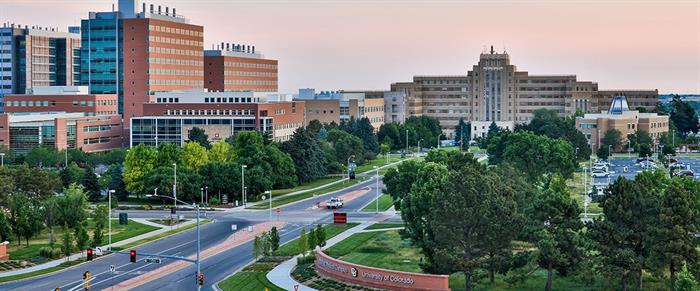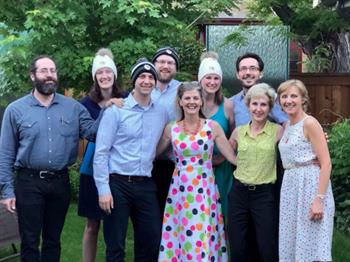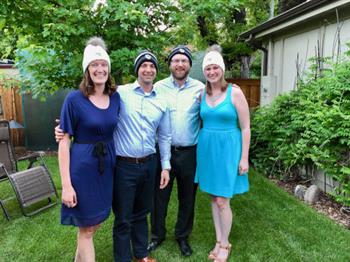Movement Disorders Fellowship
Welcome to the Department of Neurology

Program Director: Trevor Hawkins, M.D.
The University of Colorado Hospital is ranked among the top 10 academic hospitals in the United States according to the 2017 Vizient Inc.'s (formerly University HealthSystem Consortium) Quality and Accountability Study. U.S. News & World Report recognizes University of Colorado Hospital as one of the best hospitals in the nation and has ranked our hospital's specialties - including Neurology and Neurosurgery - among the best in the nation for the past 20 years. The University of Colorado Denver is the largest provider of comprehensive neurological and neurosurgical care in the Rocky Mountain Region. Our program serves as a major tertiary referral center for Colorado and many neighboring states; our service area spans from beyond the Rocky Mountains to the Midwest and the northern US border. We serve thousands of adult and pediatric patients yearly, including patients with Parkinson disease, dystonia, tremor, myoclonus, chorea, and other movement disorders.
Our fellowship is looking for high quality neurologists with a passion for movement disorders. During their first year of training, fellows will receive a solid, comprehensive clinical experience across the breadth of Movement Disorders. Fellows are strongly encouraged to complete a second year of training which is adapted to focus on the fellow's research interests and to promote their post-graduation plans.

We have thirteen faculty members working together to train two fellows each year. Each of our faculty has unique areas of expertise within movement disorders; all are committed and respected clinicians, teachers, and academicians. In addition to a solid exposure to general movement disorders, our fellows learn from specialty clinics focused on pediatric, neuro-ophthalmologic and ataxic movement disorders, Huntington's disease, deep brain stimulation (DBS), and botulinum toxin injections. We also have dedicated movement disorders palliative care clinics which are unique in the US and are an essential part of providing quality, comprehensive care. Our faculty hold clinics mostly at University of Colorado Hospital, the Veterans Affairs Hospital, Children's Hospital, and our county hospital, Denver Health. However, fellows may be required to travel to additional faculty clinics in Boulder, Lowry, and Lone Tree.

Our fellows will have the opportunity to participate in a wide range of research programs during their training. Clinical fellows are required to complete a research project during their tenure. Each of our faculty have active research with unique and overlapping areas of focus. Fellows will identify a faculty mentor at the beginning of their first year of training who will help develop the fellow's own research interests and assist in grant development. Our faculty's research programs include surgical approaches to management of movement disorders, palliative care, neuroprotective and novel symptomatic treatment of Parkinson and Huntington's disease, spinocerebellar ataxias, therapeutic uses of magnetoencephalography, cortical network patterns, fragile X-associated tremor/ataxia syndrome experimental therapeutics, among others. The programs are funded by NIH, PCORI, DOD, Michael J. Fox and other foundations and pharmaceutical companies.
Our fellows become experts in the recognition of: movement disorders and their differential diagnoses, the development of evaluations and treatment plans, the pharmacological and surgical management of Parkinson disease and dystonia, as well as in the administration of botulinum toxin. The Movement Disorders Center houses a very busy DBS Center with an experienced and collaborative team of experts. Our large multi-disciplinary team includes neurosurgeons, movement disorders specialists, neuropsychologists, rehabilitation specialists, advanced practice providers, physical therapists, and speech and swallow therapists. This dedicated team provides treatment for Parkinson disease, tremor, dystonia, orthostatic tremor, and obsessive compulsive disease. Fellows participate in weekly team conferences and train in all aspects of DBS, including patient assessment and selection, brain target decision-making, intraoperative neurophysiology, post-operative programming and trouble shooting. We train our fellows thoroughly on botulinum toxin injection techniques and overall management of muscle over-activity syndromes. While the majority of the patients we treat have movement disorders, (e.g. dystonia, tremor, or dyskinesias of various types), we also provide injections for other conditions for which botulinum toxin is indicated, such as migraine, spasticity, bruxism, and sialorrhea.
Academic activities include didactic lectures, movement disorders and neurobehavioral lecture series and community teaching. A weekly movement disorders education program (including lectures, video rounds, journal club, case presentations, and research talks) is an integral part of training. Fellows are provided a movement disorders textbook and our library of important articles as resources and to complement their formal training. Fellows are given subscriptions to the Movement Disorders Society and its journal and funding to attend the annual Movement Disorders conference in Aspen.
Eligibility Criteria
- Applicants must be a graduate of a residency program in neurology accredited by the ACGME or the Royal College of Physicians and Surgeons of Canada (RCPSC).
- Applicants should be board certified or board eligible in Neurology.
- Applicants must have successfully completed USMLE/COMLEX steps 1, 2 and 3 prior to the start of the program.
- All applicants for non-ACGME Fellowship programs must be eligible for and must obtain a full Colorado Medical License prior to the start of the Fellowship program. Licensing requirements can be found on the Department of Regulatory Agencies page: https://www.colorado.gov/pacific/dora/Physician_Licensing_Requirements#Qualifications
Application Information:
Application Season: March 3rd through September 3rd.
Interview Season: May through August
Fellowship Application Status
2023-2025 – Fellowship position filled
2025-2027 – Fellowship position filled
Application materials must be submitted through MODIF/SF Match and must include:
- Application
- CV
- 3 Letters of Recommendation
- Personal Statement
- USMLE/COMLEX Scores (1,2, and 3)
- ECFMG certification (if applicable)
Applicants must register with MODIF in order to apply to our movement disorders fellowship. To register, please visit: www.sfmatch.org. The Match Calendar is listed on the SF Match website. Applications will be received between March and August and interviews will occur From May-August.
For questions, please contact [email protected]